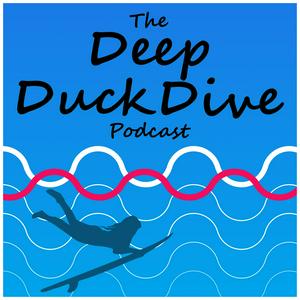Every Cape Town surfer has feels about Muizenberg
Love it, hate it, ambivalent, only when desperate, all-time favourite - every Cape Town surfer has an opinion on Muizenberg!In a bit of a break from our planned episodes, we're starting what will (hopefully) be a mini-series chatting to local surfers about Muizenberg - their history and experiences at the beach, and their thoughts, feels and opinions about it, personally or in the context of surfing more broadly - in South Africa or globally.To kick things off, in this episode, Karen and Glen chat about their own histories and experiences of surfing at Muizenberg, what they like and don't like (spoiler alert: Karen likes it more than Glen), some history of the beach and area, representation of Muizenberg in films, TV shows and academic writing, and its use as a site for contests and as a drawcard for Cape Town tourism. So join us as we take a deep duck dive (wahey!) into the place you're most likely to be forced to catch a party wave.Links to sources mentioned in the episode:Benninger, Elizabeth and Shazly Savahl. 2016. "The use of visual methods to explore how children construct and assign meaning to the “self” within two urban communities in the Western Cape, South Africa." International Journal of Qualitative Studies on Health and Well-Being 11(1): https://doi.org/10.3402/qhw.v11.31251Davis, Roxy Davis. 2024. "A world of possibilities: an exploration of experiences of children with disabilities participation in a surf therapy programme in South Africa." PhD Thesis, University of Cape Town, Faculty of Health Sciences, Division of Disability Studies: http://hdl.handle.net/11427/40740Martín-González, Roberto, Kamilla Swart and Ana-María Luque-Gil. 2021. “Tourism Competitiveness and Sustainability Indicators in the Context of Surf Tourism: The Case of Cape Town." Sustainability 13, 7238: https://doi.org/10.3390/su13137238Mahler-Coetzee, Jacques. 2017. “From Fringe To Core: Contemplating Surfing's Potential Contribution To Sustainable Tourism Development In South Africa.” Tourism in Marine Environments 12 (3-4): https://doi.org/10.3727/154427317X15062902755932Rolfe, Elana. 2015. "A formative evaluation of the development and implementation of the waves for change coach training programme.” MA Thesis, University of Cape Town, Faculty of Commerce, Department Organisational Psychology: http://hdl.handle.net/11427/33142Stroehlein, Leonie. 2021. "The increased feminization of the surfing economy: An exploration of the lived experiences of female surfers in Muizenberg, South Africa.". MA Thesis, University of Cape Town, Faculty of Commerce, School of Management Studies: http://hdl.handle.net/11427/36171Thompson, Glen. 2023. "Dreaming of 'Level Free': Lockdown and the cultural politics of surfing during the COVID-19 pandemic in South Africa." In David Andrews, Holly Thorpe and Joshua Newman (eds), Sport and Physical Culture in Global Pandemic Times: COVID Assemblages, (Palgrave Macmillan).Twidle, Hedley. 2021. "Barbarian Phase." Wasafiri, 36 (2): https://doi.org/10.1080/02690055.2021.1879478Worm Sandy. 2014. “Black People Don’t Surf.” Photography series exhibited at the Beyond the Beach Exhibition curated by Paul Weinberg, Casa Labia Gallery, Muizenberg, 21 September - 21. Artist statement at: https://monthofphotography.wordpress.com/wp-content/uploads/2014/12/sandy-worm-pdf.pdfFilm and TV Series referenced in this episodeBlack People Don’t Swim, dir. Lucilla Blankenberg, (Community Media Trust, 2008). For the full documentary about longboarder Kwezi Qika, see https://www.cmt.org.za/list-of-documentaries/ (scroll down to the film).Amaza, dir. Lucilla Blankenberg, Laddie Bosch and Tim Spring, (Community Media Trust, 2014). This 13 episode TV series was aired on SABC1.https://www.tvsa.co.za/shows/viewshowseasons.aspx?showId=2228&season=1https://www.cmt.org.za/our-work/#primetimetvFor a behind the scenes of making Amaza video, see: https://www.youtube.com/watch?v=yzA-eWrFj00We received funding for podcast recording equipment from the Department of Women's and Gender Studies, Faculty of Arts and Humanities, at the University of the Western Cape, as part of the New Imaginaries for an Intersectional Critical Humanities Project on Gender and Sexual Justice, a project funded by the Andrew W. Mellon Foundation.Thanks to Christine King for our logo design. Check out her book, Stormcaller - you can buy it via her website: https://www.christineking.co.za/.Karen Graaff is a Research Fellow, Women's and Gender Studies, University of the Western Cape.Glen Thompson is a Research Fellow, History Department, Stellenbosch University.


